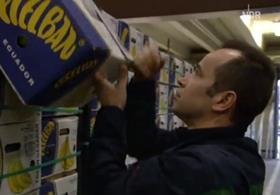
Government officials in Ecuador have heavily criticised a German television documentary in which the Latin American country's banana export industry is accused of exploiting workers and using pesticides intensively in order to produce fruit which is 'perfect, but cheap'.
But despite the country's protestations, it has emerged that Univeg Deutschland – one of Germany's leading banana importers in its own right as well as a ripener of the fruit for other major suppliers like Chiquita – took immediate action to address concerns about pesticide usage by cancelling its commercial partnership with another German group, Anton Dürbeck, on whose behalf it had been ripening fruit sold under the Excelban brand.
Der Preis Der Bananen(The Price of Bananas), aired by German television channel NDR as part of its investigative series 45 Min, has since been described as inaccurate and misleading by Ecuador's Ministry of Foreign Affairs, Trade and Integration.
'Ecuador rejects the documentary, which contains information aimed at discrediting the country's status as a leading global exporter,' the ministry said in a statement.
'It ignores measures introduced in recent years, both in the public and private sectors, to guarantee product quality and safety for the final consumer by adopting and enforcing strict standards in terms of the environment, workers and communities.'
The ministry also claimed that government officials had not been consulted or approached for comment while the documentary was being made.
Under scrutiny
At the beginning of the programme, viewers were shown consignments of banana boxes bearing trademarks belonging to leading importers Cobana Fruchtring (Bananas of Ecuador), Anton Dürbeck (Excelban) and Univeg Deutschland (1&1), as well as distinctive red cartons carrying the name of leading retailer Rewe.
These and other companies operating in the German market are by now well used to being under the microscope when it comes to the sustainability, safety and social responsibility of the bananas they bring to market, coming as they do under regular scrutiny and pressure from NGOs and the media.
Speaking to the programme-makers, Anton Dürbeck managing director Mathias Dürbeck insisted standards remained high thanks to strict certification, but admitted pesticide usage was necessary to maintain the quality of the product and protect it from disease.
Addressing 45 Min's concerns that pesticide usage standards had, the interviewer said, been breached by Oro Banana SA (Obsa) – a grower supplying Anton Dürbeck under the Excelban label – because it allegedly ignored rules governing where and when pesticides can be sprayed from aircraft, Univeg Deutschland managing director Thomas Averhoff told the interviewer that it had terminated its supply agreement with Anton Dürbeck 'with immediate effect' once it became aware of the allegations.
The impact of the documentary on the German market comes at a significant time, given that around one in three bananas sold in the country traditionally comes from Ecuador and particularly given that this year's Ecuadorean crop is considerably lower than usual due to recent poor weather.
Univeg itself has since argued that strict rules already in place to govern pesticide usage and social responsibility ensure that industry is able to root out any problems.
'As members of the BSCI (Business Social Compliance Initiative), social compliance is an absolute number one priority,' commented Francis Kint, managing director of Univeg's fruit and vegetable division.
'We fulfill one role as a ripener of someone else's fruit, but when it comes to us buying bananas ourselves then social compliance is a must,' he told Eurofruit. 'We know for a fact that there was no link between the product flows in the shots taken by the documentary maker.'
Organic concerns
Conventional bananas purchased by the documentary team at a branch of Rewe-owned supermarket chain Sky and tested in a laboratory were found not to contain traces of pesticides used in the production process.
However, the laboratory reported it had found traces of insectides on the stems and skin of organic bananas bought and tested at the same time, a result that lead scientist Eckard Jantzen described as 'surprising and unusual'.
Rudi Pfeiffer, whose company Banafair reportedly imported the bananas, told the programme: 'I guess consumers cannot expect that organic products in general are residue-free. This guarantee is not associated with organic. It is about a different method of cultivation that rejects the use of pesticides.'



